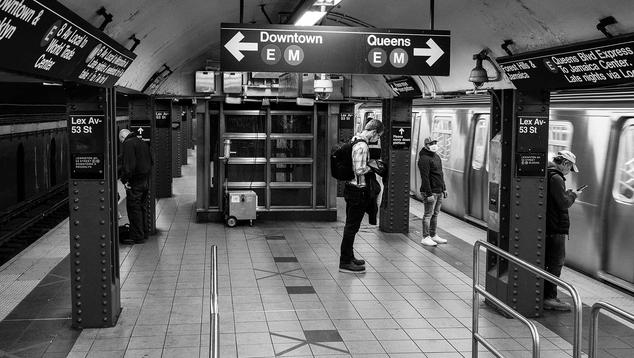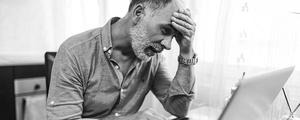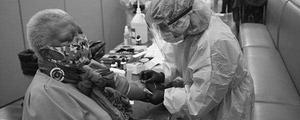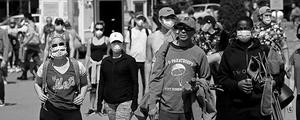Most -- but not all Americans -- believe that social distancing saves lives. Gallup's coronavirus tracking poll finds that most Americans are either "very confident" (54%) or "moderately confident" (31%) in this belief. A relatively small minority (14%) express skepticism, saying they are either "not at all confident" or "not too confident" in it. These beliefs are associated with Americans' willingness to follow public health directives on COVID-19 and also with their public health-relevant behaviors such as avoiding multi-person spaces, taking precautions and refraining from visiting places outside the home.
Many state and local governments around the U.S. are beginning to lift strict public health restrictions on activity. Yet, public health experts warn of ongoing risks -- new or renewed local epidemics breaking out around the country. These epidemics and their death toll will depend on how vigorously Americans, in the absence of government policies, voluntarily take appropriate social distancing precautions. Is Americans' adoption of these precautions in their own lives related to confidence in the belief that social distancing saves lives?
From April 6-May 10, most Americans practiced substantial social distancing, with an average of 88% saying they "always" or "very often" did so over the past 24 hours. Nearly all of those who are very confident social distancing saves lives, 95%, report practicing it as often, as do 87% are those who are moderately confident it saves lives. However, just over half, 57%, of those who are skeptical about the efficacy of social distancing practice it. When focusing on only those who report "always" practicing social distancing, the differences are even more stark. Seven in ten (71%) Americans who are most confident in social distancing said they always did so over the last 24 hours. This compares with 47% of the moderately confident group who are always social distancing and only 27% of the skeptical group.
Moreover, variations in confidence that social distancing saves lives carries over to specific precautionary activities. Those in the very confident group are far more likely than the skeptical group to avoid travel (by plane, bus, subway or train), small gatherings of people (family or friends) and public places (such as stores or restaurants). Those moderately confident about social distancing fall between these groups, though their views are closer to those of the very confident group.
| Not at all/Not too confident | Moderately confident | Very confident | |||||||||||||||||||||||||||||||||||||||||||||||||||||||||||||||||||||||||||||||||||||||||||||||||
|---|---|---|---|---|---|---|---|---|---|---|---|---|---|---|---|---|---|---|---|---|---|---|---|---|---|---|---|---|---|---|---|---|---|---|---|---|---|---|---|---|---|---|---|---|---|---|---|---|---|---|---|---|---|---|---|---|---|---|---|---|---|---|---|---|---|---|---|---|---|---|---|---|---|---|---|---|---|---|---|---|---|---|---|---|---|---|---|---|---|---|---|---|---|---|---|---|---|---|---|
| % | % | % | |||||||||||||||||||||||||||||||||||||||||||||||||||||||||||||||||||||||||||||||||||||||||||||||||
| Avoided public places | 45 | 70 | 85 | ||||||||||||||||||||||||||||||||||||||||||||||||||||||||||||||||||||||||||||||||||||||||||||||||
| Avoided small gatherings | 49 | 75 | 89 | ||||||||||||||||||||||||||||||||||||||||||||||||||||||||||||||||||||||||||||||||||||||||||||||||
| Avoided travel | 65 | 85 | 92 | ||||||||||||||||||||||||||||||||||||||||||||||||||||||||||||||||||||||||||||||||||||||||||||||||
| Stocked up on supplies | 37 | 51 | 63 | ||||||||||||||||||||||||||||||||||||||||||||||||||||||||||||||||||||||||||||||||||||||||||||||||
| Worn a mask outside | 42 | 68 | 81 | ||||||||||||||||||||||||||||||||||||||||||||||||||||||||||||||||||||||||||||||||||||||||||||||||
| Worked from home* | 36 | 53 | 74 | ||||||||||||||||||||||||||||||||||||||||||||||||||||||||||||||||||||||||||||||||||||||||||||||||
| Stayed home from work and unable to work* | 9 | 19 | 19 | ||||||||||||||||||||||||||||||||||||||||||||||||||||||||||||||||||||||||||||||||||||||||||||||||
| * Asked April 6-27 | |||||||||||||||||||||||||||||||||||||||||||||||||||||||||||||||||||||||||||||||||||||||||||||||||||
| Gallup Panel, April 6-May 10 | |||||||||||||||||||||||||||||||||||||||||||||||||||||||||||||||||||||||||||||||||||||||||||||||||||
Similarly, those very confident in the effectiveness of social distancing are highly likely to report they have worn a face mask when outside the home, have worked from home in the past seven days, and have stocked up on food, medicine, or cleaning supplies. The moderately confident group is somewhat less likely to have taken these steps while the skeptical group is even less likely, particularly in terms of wearing a mask.
When asked to say which specific types of public places they have been in the past 24 hours, it's the skeptical group that is much more likely to have visited each and all of them, particularly grocery and other stores, someone else's home, and work. Both the moderately and very confident groups are significantly less likely to have ventured out.
| Not at all/Not too confident | Moderately confident | Very confident | |||||||||||||||||||||||||||||||||||||||||||||||||||||||||||||||||||||||||||||||||||||||||||||||||
|---|---|---|---|---|---|---|---|---|---|---|---|---|---|---|---|---|---|---|---|---|---|---|---|---|---|---|---|---|---|---|---|---|---|---|---|---|---|---|---|---|---|---|---|---|---|---|---|---|---|---|---|---|---|---|---|---|---|---|---|---|---|---|---|---|---|---|---|---|---|---|---|---|---|---|---|---|---|---|---|---|---|---|---|---|---|---|---|---|---|---|---|---|---|---|---|---|---|---|---|
| % | % | % | |||||||||||||||||||||||||||||||||||||||||||||||||||||||||||||||||||||||||||||||||||||||||||||||||
| Work | 42 | 29 | 19 | ||||||||||||||||||||||||||||||||||||||||||||||||||||||||||||||||||||||||||||||||||||||||||||||||
| Grocery store | 63 | 47 | 36 | ||||||||||||||||||||||||||||||||||||||||||||||||||||||||||||||||||||||||||||||||||||||||||||||||
| Pharmacy | 21 | 16 | 13 | ||||||||||||||||||||||||||||||||||||||||||||||||||||||||||||||||||||||||||||||||||||||||||||||||
| Other store | 34 | 19 | 12 | ||||||||||||||||||||||||||||||||||||||||||||||||||||||||||||||||||||||||||||||||||||||||||||||||
| Restaurant | 23 | 13 | 9 | ||||||||||||||||||||||||||||||||||||||||||||||||||||||||||||||||||||||||||||||||||||||||||||||||
| Another home | 29 | 15 | 10 | ||||||||||||||||||||||||||||||||||||||||||||||||||||||||||||||||||||||||||||||||||||||||||||||||
| Doctor or hospital | 10 | 8 | 5 | ||||||||||||||||||||||||||||||||||||||||||||||||||||||||||||||||||||||||||||||||||||||||||||||||
| Gallup Panel, March 27-May 10 | |||||||||||||||||||||||||||||||||||||||||||||||||||||||||||||||||||||||||||||||||||||||||||||||||||
As strict limitations end, business resumes, stores re-open and prevention recommendations proliferate, Americans will watch as the pandemic rolls throughout the country -- with epidemics waning here, waxing there. Absent a vaccine, and until herd immunity builds up (estimated to occur when somewhere between 50% and 90% of the population is infected and immune), much will depend on the precautions taken by individuals.
While most Americans believe that social distancing saves lives and are generally taking reasonable precautions, a significant minority are skeptical, and others are only moderately confident. Even under stay-at-home restrictions, these individuals are relatively less likely to sustain social distancing, less likely to avoid contact, less likely to take precautions and more likely to visit locations with other people. To limit risk as phases of a "return to normal" unfold, clear and consistent messaging about the benefits of social distancing becomes even more critical.
Learn more about how the Gallup Panel works.




